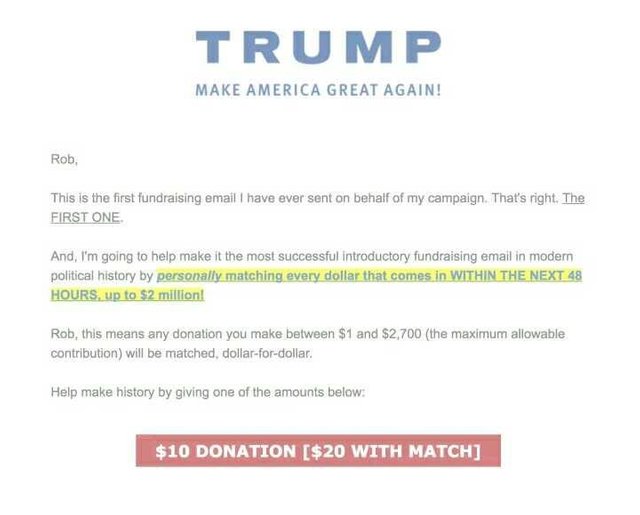Missing the Small Donor Boat Shows Trump’s Failure as a Businessman
Missing the Small Donor Boat Shows Trump’s Failure as a Businessman

On Tuesday, 372 days after first descending the escalator to announce his candidacy, Donald Trump sent his first fundraising email of the campaign.
For most campaigns, an e-mail like this is the first order of business. Not only do normal candidates need to show fundraising strength in their first financial quarter, but they also need to begin cultivating a loyal base of supporters who are conditioned to give repeatedly in small amounts at every step. Bernie’s $27 average contribution has become a narrative staple of his campaign and his grassroots message and intentional focus on list growth and activation let him outraise the Clinton machine in the primary.

Donald Trump doesn’t seem to grasp the basics of modern political organizing, so on one level, it’s not surprising that he hasn’t built a real digital operation. He might argue that he’s a different kind of candidate who won the primary without it, so why start now?
Online fundraising is different. His failure to convert his loyal fans at rallies or on Twitter into donors has actively cost him a hefty sum of his personal wealth.
By some accounts, Trump has less than $165 million in liquid cash. So far, he has plowed $45 million into his campaign, or roughly one fifth of what his liquid cash may have been at the start of the campaign.
The millions of campaign dollars he has funneled into his companies only partially offset these losses on his personal balance sheet. Like every company, the Trump Organization has expenses to pay. Its profit margin appears to be in the low single digits, with $9.5 billion in annual revenue according to PrivCo and approximately $300 million in profit. Trump may be self-dealing, but he’s probably only seeing 4 cents from every dollar the campaign pays his companies. On the revenue side, Trump has provided 71 cents of every dollar the campaign has raised. He’s still losing money on this, bigly.
The irony in all of this is that Trump very easily could have raised all the money he needed for the primary (and a significant share for the general) from small donors through the Internet.
I don’t like Trump, but speaking objectively and from experience, Trump’s low-rent demagoguery is tailor-made for fundraising success on the Internet. Trump appeals viscerally to a grassroots concerned about immigration, security, and the loss of American identity. He’s been able to fill stadiums for rallies (provided they are close enough to the election). He’s generated massive revenues for media companies and built an unprecedented social media following for a Republican candidate. He’s been able to do things at a grassroots level that no other Republican candidate before has done, and had he tried earlier, this would have translated to tens of millions in online contributions in the primary and hundreds of millions in the general.
About the only place Trump’s political success so far isn’t reflected is in own campaign bank account — which has burned through all but $1.3 million in cash with five months to go.
At some point, Trump decided it would be better for him to further the narrative that because he was self-funding, he was beholden to no one. $45 million might have been an affordable sum to win a primary for a business mogul in the twilight of his career. The problem is that in doing so, he painted himself into a corner. He demonized big donors whose wallets are now shut. He dampened the enthusiasm of grassroots donors by telling him he didn’t need their money. He’ll now have to grovel for money, exactly what he didn’t want to do to begin with, from a much more skeptical audience starting from a position of weakness, not strength. And when that fails, he’ll almost certainly need to pony up cash he may very well not have.
The financial success of the Bernie Sanders campaign shows how an outsider campaign can not only be financially successful, but can lap the field in fundraising. Like Trump, Sanders differentiated himself from his party’s elite by casting himself as an independent outsider not beholden to special interests. Unlike Trump, Sanders found a way to finance his insurgency through grassroots donations. And the power of an activated online grassroots army beats big donors or self-funders, in both parties.
In the Republican race, the fundraising leaders were not donor-friendly figures like Jeb Bush and Marco Rubio (in terms of their campaign committees) but Ted Cruz and Ben Carson, conservative favorites who were able to rely heavy on digital and direct mail. (In Carson’s case, the balance was shifted too heavily in the direction of mail, which meant he immediately burned through much more of his money.)
Given his impassioned support, there is no reason Trump couldn’t have had the same success, and had it early. A conservative publication emailed me early in the race to tell me Trump had raised $700,000 using their email list. And he’s certainly sold a lot of hats online, so the idea of raising money in small amounts should not be completely foreign to him.
By not tapping into this support early, however, Trump has left hundreds of millions of dollars on the table, a gap he’ll need to fill from his personal fortune or by diverting resources from the party that could have gone to field organizing or downballot races. The reason for this is simple: compounding returns. The majority of money that a competent Presidential campaign will raise will come not from visits to a website or online advertising, but from having a captive audience on an email list. Two thirds of the $500 million that Obama raised online in 2012 came in from its email list, because they had four years of lead time to build a list of 16 million people. Hillary Clinton’s team considered this function so important that it set up a SuperPAC, Ready for Hillary, whose sole function was to build a list of 4 million supporters in the absence of a candidate. The larger the list and the more conditioned your donors are to believe that their support will make a difference, the better your fundraising.
Trump hasn’t emailed supporters for money in a year. He’s also made it exceedingly difficult for people visiting his website to join his email list so they can be asked for money. Compare the user experience when signing up for emails from both candidates:
I'm sorry I'm not too familiar with this. sorry for the respect @cheetah
@eropa